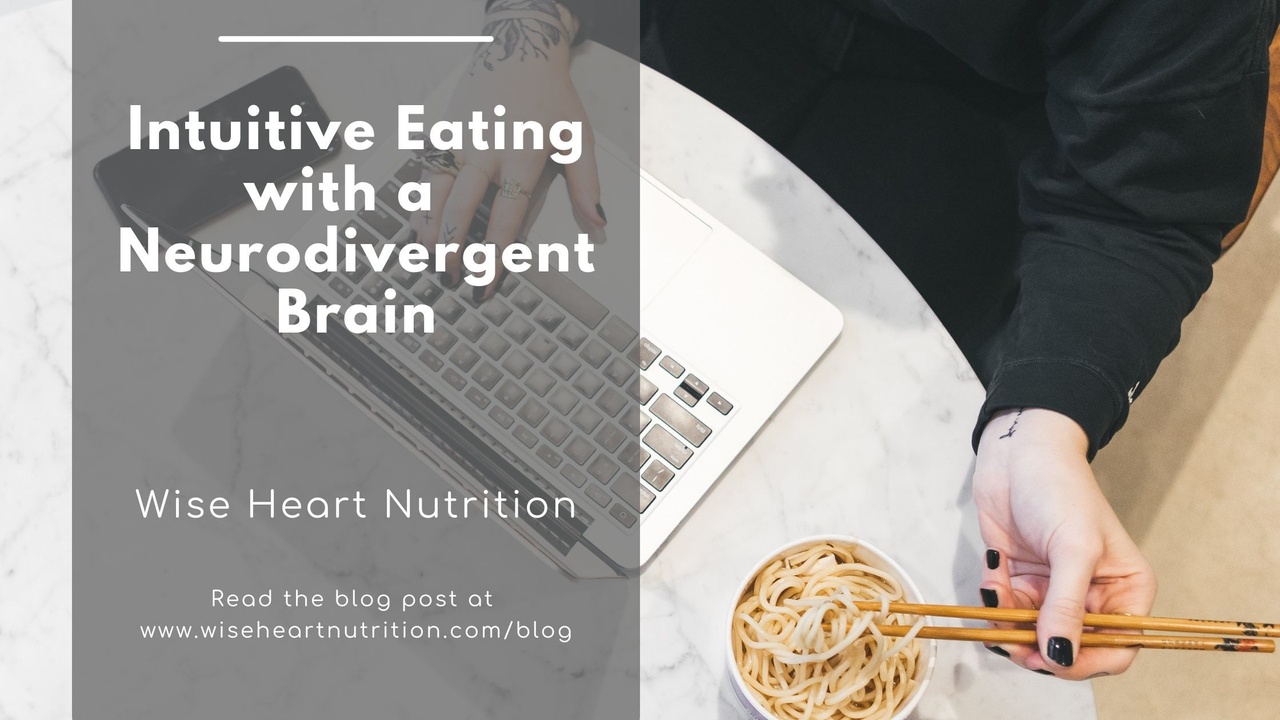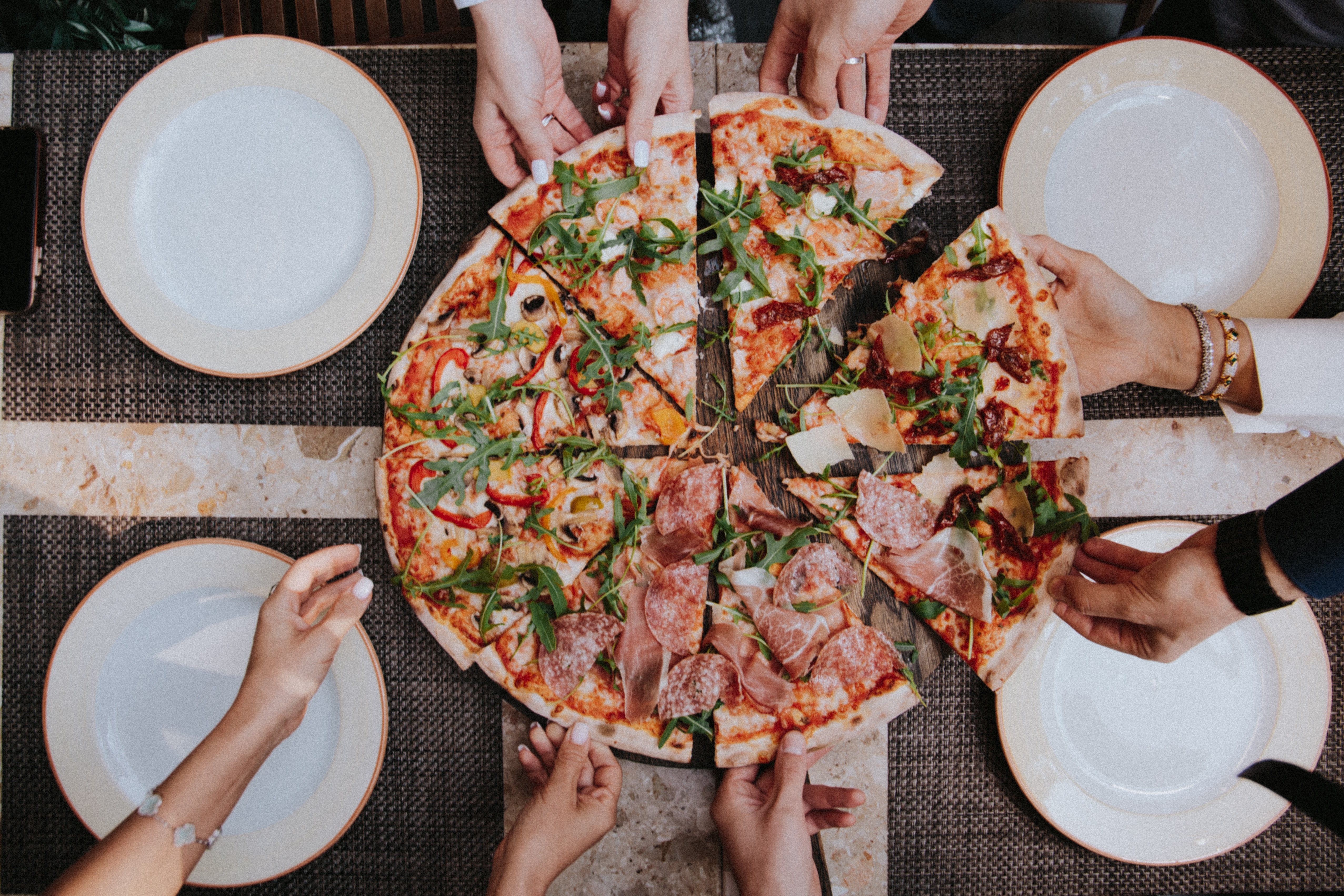Rethinking Intuitive Eating for Neurodivergent (ADHD, Autistic) Brains

You may have heard (or even felt) criticism that intuitive eating is not possible for neurodivergent (i.e. ADHD, Austistic) people. At Wise Heart Nutrition, we reject that all-or-nothing thinking and invite you to explore our approach, and see how intuitive eating may need to be modified to be realistic for you. Here, we reframe each of the 10 principles of Intuitive Eating to be inclusive of neurodivergent folx. It might not feel ~magically intuitive~, but setting up systems that work for you in order to honor your body’s needs with compassion is 100% intuitive eating.
Reject the Diet Mentality... even if you don't diet.
While this is obviously easier said than done, everyone can embrace this first principle. It helps to learn more about how diets don’t work. Like how in 90-97% of cases, those who lost weight will gain it back within 2-5 years; and about ⅔ of people will gain back even more weight than they originally lost. The diet and weight loss industry made $78 BILLION in 2019 (with a B!) - they don’t need anymore of your money, time, or stolen happiness. And if you don't diet, you may still struggle with food because of executive function related issues. You don't have to be giving up diets in order to engage in the Intuitive Eating process. But either way, we recommend getting angry and tell diets and diet culture to f off!
Honor Your Hunger... by creating opportunities to notice it
Many neurodivergent folx struggle with honoring hunger, due to difficulty with interoceptive awareness. Interoception is essentially how the body is feeling on the inside. Our awareness of our internal experience influences how we respond through action, behaviors, emotions, etc. When we are attuned to our interoception we can better respond to, manage, and regulate our body’s physical and emotional needs from moment to moment. Some examples of interoceptive awareness include dry mouth to signal thirst, shivering to signal coldness, fast heart beat to signal stress / threat, stomach butterflies to signal nervousness, and grumbling stomach to signal hunger.
Hunger is a prime example of interoception. Under-awareness to hunger and fullness cues (which come from all the different body systems, not just your stomach) can lead to both restriction and overeating. When interoceptive awareness is low, you may not even notice early hunger signals (increased saliva production, decreased focus, thoughts of food) and then suddenly feel consumed by late hunger cues (gnawing pain in stomach, dramatic mood shift, fatigue, difficulty concentrating). When you finally feel hungry, your body has likely been hungry for a while, maybe hours, and you didn’t even know it.
To top it off, executive function skills are worsened by hunger, which can lead to loss of focus, fatigue, and feeling overwhelmed or overstimulated.
Neurodivergent folx often need to CREATE EXTERNAL STRUCTURE IN ORDER TO CHECK IN WITH HUNGER SIGNALS. Some go-to methods can include setting alarms/reminders, keeping ready snacks in plain sight or arm’s reach, lots of visual notes, or eating according to a schedule.
Make Peace with Food... and your food preferences
This principle usually refers to making peace with foods you have previously restricted or limited, and feeling radical permission to enjoy all foods without assigning “good”/”bad” labels to any of them.
For those who are neurodivergent, a helpful addition to this principle is to MAKE PEACE WITH YOUR SENSORY PREFERENCES OR BEHAVIORS AROUND FOOD. You don’t have to love or enjoy all foods to participate in intuitive eating. Sure, trying new foods once in a while can be a great goal, but there is no shame in choosing your food based on your sensory or taste preferences.
Some neurodivergent people tend to hyperfixate on foods for a period of time - and there’s nothing wrong with that either. Variety can be a useful aim in gentle nutrition, but that doesn’t mean you have to incorporate wide variety in your day, or even in weeks.
Give yourself some compassion in your relationship with food and flexibility on what that looks like for you. YOU get to decide what foods and nutrition guidelines are helpful to you!
Challenge the Food Police... and the neurotypical police
Similar to the first principle, this message can be implemented by anyone. Challenge the meanie in your head who may praise you for eating “good” foods, restricting “bad” foods, or bullies you for not following diet culture’s unending rules.
Additionally, CHALLENGE THE NEUROTYPICAL POLICE, who may look down their noses at you for not doing intuitive eating the “right” way. (hint: there is no right way, because the whole point is to honor you!) Whatever strategies or tools you need to help care for and feed yourself are valid.
Discover the Satisfaction Factor... feel permission to seek out dopamine
The fun one! Why shouldn’t food bring pleasure, satisfaction, and dopamine into your life? Give yourself unconditional permission to enjoy your favorite sensory foods or your current fixation snack. You may find yourself drawn towards foods that diet culture admonishes when you need a dopamine kick… but denying yourself the pleasure and reward will only lead to seeking it out even more. HONOR YOUR NEED FOR DOPAMINE, and know that food is an acceptable source of stimulation!
Feel Your Fullness... and allow for external stimulation
This principle can be difficult for neurodivergent folx for the same reason as hunger: interoceptive awareness. It’s possible that you are not as aware of what fullness feels like in your body, and it’s also possible that you can be hyper-aware of a full feeling and interpret it as discomfort. When dealing with overstimulation, it can be especially hard to tap into your hunger and fullness cues. Fullness can present as dissipated interest in food, a sense of satisfaction, or a comfortable feeling of fullness in the abdomen.
It may be helpful to try deep belly breathing prior to a meal to acclimate your body to the feeling of fullness and to set up moments through or after your meal to concentrate on body sensation. But, don't let this turn into neurotypical advice of "limit distractions while eating", "always be mindful during meals", or "don't play with your food". Neurodivergent brains may need to EXTRA STIMULATION at meals in order to tune into the body's cues.
Cope with Your Emotions with Kindness... give yourself what you need
This principle is often interpreted as advice to not eat for emotions, but food can be used as a coping skill and emotional hunger can be honored. For neurodivergent people who have trouble sensing and responding to physical hunger cues, having the urge to use food as a stim, or for soothing, can be important tools for self-care.
In addition, hunger can cause mood swings and anxiety, so your heightened emotions might actually just be another clue that your body is hungry and needs food.
Respect Your Body... and your brain
This principle can be practiced by every body. Having respect for your body doesn’t mean that you have to like or love your body, today or any day. It does mean that you recognize that every body inherently deserves respect and compassion, yours included.
You can support and respect your body by acknowledging that it is incredibly wise and is doing the best it can to take care of you, even on days when you feel frustrated. Similar to respecting your body, it is also important to RESPECT YOUR BRAIN, and understand that it works differently, but that doesn't mean it is broken!
Movement - Feel the Difference... make it simple, accessible, & fun
Traditional and diet-culture based forms of movement are often less accessible to neurodivergent folx (and lots of other people as well). For those with heightened sensory awareness, some movements may be uncomfortable. For those with executive functioning challenges, types of movement that require sustained effort over time may be difficult to continually incorporate, and monotonous movement can get super boring, super quickly. It may just be that your interests change often, including types of movement - that’s totally fine. It is also important to name that navigating a world that wasn’t built for your brain can be so exhausting that even contemplating movement feels impossible.
It can be helpful to redefine what movement actually looks like - all movement (even fidgeting) "counts". Ask yourself how you can MAKE MOVEMENT SIMPLE, ACCESSIBLE, and FUN! If and when you do choose to engage in movement, notice any effects that it has on how you feel, physically, emotionally, and of course, mentally. Even 30 seconds of shaking out your arms, wiggling in your chair, or stretching can stimulate your brain when you fall into a funk.
Honor Your Health with Gentle Nutrition... support your body and brain
This is always the last principle we come to in the IE process, but it tends to be something that gets focused on very heavily in diet culture. Gentle nutrition is eating in order to meet your foundational food needs (consistency, abundance, variety, pleasure), while also considering what feels good in YOUR body, and what might be specifically supportive of your body at any given time.
For neurodivergent folx, this might include incorporating nutrients that support brain health, working on blood sugar balance to stabilize mood and energy throughout the day, and knowing enough about yourself to anticipate hunger or fuel needs. You may need different tools or strategies, or even more self-compassion, than neurotypical people to accomplish your goals.
And, if you are struggling with any of the Intuitive Eating principles, or need support to create tools and strategies or ways to effectively implement them, working with a dietitian may be helpful!!!

